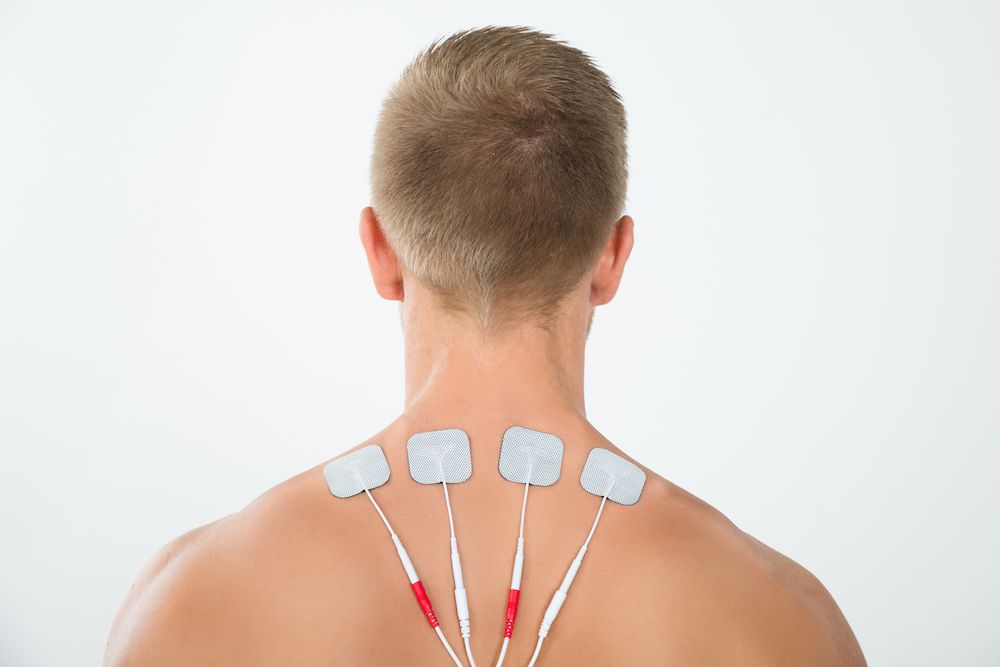This is a treatment procedure that involves using electrical current for treating chronic pain. There are two types of electric nerve stimulations: spinal cord stimulation and peripheral nerve stimulation.

Both types use a pulse generator to target nerves with electrical pulses. The pulses affect nerve impulses responsible for pain sensation. You can learn more below about electrical nerve stimulation for chronic pain.
The Nerve Stimulation Process
Nerve stimulation happens in the following way. First, the doctor will insert an electrode in the skin as a test. The electrode will be connected to the stimulator controlled by the patient. If the test step is successful, the doctor will replace the test simulator with a permanent one under the patient’s skin.
Inserting the permanent stimulator occurs under a sedative and local anesthetic. The doctor implants the stimulator under the patient’s skin and inserts small leads or coated wires under there as well. The wires connect the stimulator to the nerves or the spinal cord.
Electrical Nerve Stimulation - What To Expect
After inserting the nerve stimulator under your skin, the doctor will teach you how to use it. With the doctor’s help, you will determine the ideal pulse strength for you. You will learn how the nerve stimulator works for use even at home.
In most cases, the stimulation of the spinal cord schedule comprises one or two hours, three or four times per day. You may experience a stinging feeling when operating the electrical nerve stimulation. You will get an incision which you must keep dry and clean.
Electrical Nerve Stimulation For Chronic Pain
Electrical nerve stimulation is the best for people who suffer from severe or chronic pain. These people have conditions such as unsuccessful back surgery, pain in the nerves, and numbness. Doctors can treat chronic pain conditions using stimulation.
This stimulation is ideal for conditions such as paraplegia and multiple sclerosis. However, the stimulation treatment does not work for all chronic pain types. The procedure is the best following the failure of other treatments.
Risks Related To Electrical Nerve Stimulation
It is vital to understand the risks associated with electrical nerve stimulation. Risks include the formation of scar tissue surrounding the electrode and the current leads shifting from their position. There is also the possible risk of hardware failure or breakage of the electrode.
Other risks are infection, spinal fluid leakage, bladder issues, and worsening pain. Some patients experience headaches from the stimulation of the spinal cord.
Factors To Consider
If you are thinking about getting electrical nerve stimulation, you need to evaluate if the treatment is appropriate for your condition. While the stimulation may work for some types of chronic pain, it may fail for others. The initial relief that patients experience often follows a decline in effectiveness. The gradual decline is due to the body’s growing tolerance to the stimulation.
There is not much evidence on the effectiveness of electrical nerve stimulation. The success of the treatment will depend on the source of the pain. Contact your chiropractor to learn more about if it’s right for you.
For more on electrical nerve stimulation for chronic pain, contact Charleston Chiropractic Associates at our office in Charleston, South Carolina. You can call (843) 225-4357 today to schedule an appointment.
QUICK LINKS
Quick Links
HELPFUL ARTICLES
Services
General
Health
Conditions
- Corrective Exercises
- Chiropractic Care for Kids
- Chiropractic Senior Care
- Acupuncture
- Holistic Treatments
- Chiropractic Care for Ear Infections
- Work Related Injuries
- Physiotherapy Treatments
- Therapeutic Adjustments
- Cranial Facial Release
- Spinal & Postural Screenings
- Massage Therapy
- Chiropractic Adjustments
- Chiropractic FAQ’s
- Common Myths About Chiropractic Care
- What to Expect at Your First Chiropractic Visit
- Choosing the Right Chiropractor for You
- Candidates for Chiropractic Care
- Methods of Chiropractic Care
- The Importance of Regular Chiropractic Visits
- Chiropractic Care – Overview
- Benefits of Chiropractic Care
